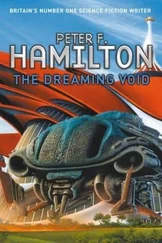“Suppose you fill me in on some background. What exactly is this behavioural reorientation work you’re doing here?”
“You know what kind of inmates we hold here?”
“Yeah. That’s why I’m so interested in meeting Liam Bursken. I saw the holograms of Kitchener in situ. Tell you, it was plain butchery. I’ve seen atrocities in battle, and not just committed by the other side. But the kind of mind which perpetrated that was way outside my experience. I want to know what it looks like.”
MacLennan nodded sympathetically. “Well, the motivation behind their crimes are basically psychological, in all cases deep-rooted. None of the serial killers sell drugs, or steal, or commit fraud, any of the normal range of criminal activities.
That sort of everyday crime is mostly a result of sociological conditioning; broadly speaking, solvable if they were given better housing, improved education, a good job, stable home environment, etc.-it’s a process for social workers and parole officers-whereas the Centre’s inmates probably had those advantages before they came in. They do tend to have reasonable IQs, steady jobs, sometimes even families.”
“Do any of them have exceptional IQs?” Greg asked.
MacLennan flicked an enquiririg glance at Stephanie Rowe. “Not that I’m aware of,” he said. Why do you ask?”
“Kitchener’s students are all very bright people.”
“Ah, I see, yes.”
“No one here has anything above average intelligence,” Stephanie announced; she was studying her cybofax. “Certainly we have no geniuses resident. Do you want me to request past case histories?”
“No, that’s all right,” Greg said.
“What we are trying to do at Stocken,” MacLennan said, “is alter their psychological profiles, eradicate that part of their nature which extracts gratification from performing these barbaric acts.”
“Brainwashing?”
“Absolutely not.”
“It sounds like it.”
MacLennan gave him a narrow smile. “What you refer to as brainwashing is simply conditioned response. An example: strap your subject in a chair and show him a picture of an object, say a particular brand of whisky. Each time the whisky appears you give him an electric shock. Repeated enough times the subject will become averse to that brand. I have grossly over simplified, of course. But that is the principle, installing a visually triggered compulsion. What you are doing in such cases is ingraining a new response to replace the one already in place. But it can only produce results on the most simplistic level. You cannot turn criminals into law-abiding citizens by aversion therapy, because criminality is their nature, derived subconsciously, not a single yes/no choice. And what we are dealing with in Stocken’s inmates is a behaviour pattern often formed in childhood. It has to be erased and then replaced.”
“How?”
“Have you heard of educational laser paradigms?”
“No,” Greg said drily.
“It’s an idea which goes back several decades. It was the subject of my doctoral thesis. I started off in high-density data-handling techniques, but got sidetracked. Educational paradigms were so much more interesting. They are the biological equivalent of computer programs. You can literally load subject matter into the human brain as though you were squirting bytes into a memory core. Once perfected, there will be no need for schools or universities. You will be given all the knowledge you require in a single burst of light, sending the information through the optic nerve to imprint directly on the brain.” MacLennan shrugged affably. “That’s the theory, anyway. We are still a long way off achieving those kind of results.”
“It sounds impressive,” Greg said. “And you can use it to install new behaviour patterns as well?”
“Behaviour is rooted in memory, Mr Mandel. Conditioning again. You fall into a pool when you are a young child, nearly drowning; and in adult life you are wary of water, a poor swimmer, nor do you have any enthusiasm to improve. It is these countless cumulative small events and incidents in your formative years which decide the composition of your psyche. You are a soldier, I believe, Mr Mandel?”
“Was a soldier. I’m retired now.”
“You volunteered for the army?”
“Yeah.”
“And were you any good as a soldier?”
Greg shifted his weight on the settee’s amorphous cushioning, conscious of Stephanie’s stare. “I was mentioned in dispatches once or twice.”
“And yet thousands, hundreds of thousands, of men your age were totally unsuitable for the military life you excelled in. Physically no different, but mentally, in outlook, your exact opposite. The respective attitudes both determined in the period between your fourth and sixteenth birthdays. We are what we are because of that time, the child being the father of the man. And that is the time we must alter in order to eradicate real-time psychoses. My aim is to substitute false paradigmatic memories for real recollections, thus effecting a radical change of temperament.”
“Have you had any success?”
“Limited, but most promising given we have only been here two years. We have already succeeded in assembling some highly realistic synthetic memories. There is one, a walk through a forest.” He closed his eyes and the eagerness and tension which had built up as he spoke drained out of his face, leaving him strangely peaceful. Almost the same expression as a synthohead, Greg thought.
“I can see the trees,” MacLennan said, his voice reduced to a placid lilt. “They are large, tall as well as broad, in full leaf, oaks and elms. This is pre-Warming, midsummer, with sunbeams breaking through the overhead branches. I can see a squirrel, a red one; he’s racing up an oak, round and round the trunk. I’m standing below watching him, touching the bark. It’s rough, crinkled, dusted with a powdery green algae. The grass is ankle-high, dewy, wetting my shoes. There are foxgloves everywhere, and weasel-snout; I can smell honeysuckle.”
“Lasers can imprint a smell?” Greg asked sceptically.
“The memory of a smell,” Stephanie said pedantically. “We adapted the paradigm from a high-definition virtual reality simulation, then added tactile and olfactory senses, as well as emotional responses.”
“Emotional responses?”
“Yes. Interpretation is a strong part of memory. if you see a particularly beautiful flower in the forest, you feel good about it; tread in a dog turd on the path, and you’re disgusted.”
Greg thought about it. He couldn’t fault the logic, it was just that the whole concept seemed somewhat fanciful. But someone on the Berkeley board obviously had enough faith to invest in it. Quite heavily, judging by the facilities the Centre offered.
“Have you received this memory as well?” he asked her.
“Yes. It’s very realistic. It feels like I was actually in that forest. James forgot to mention the birdsong. The thrushes are warbling the whole time.”
Greg turned back to MacLennan, who was watching him levelly.
“How does this help to cure axe murderers?” Greg asked.
“Imagine when you were young if you took that same walk through a tranquil forest for half an hour instead of having to endure your drunken father beating you. If you had that walk, or played football, every evening he came home drunk; if you could remember your mother giving him a kiss instead of crying and screaming for mercy, I think you’d find your outlook on life would be very different.”
“Yeah, and is it going to be possible?”
“I believe so. Once we have solved the problem of how to erase, or at the very least weaken, old memories. This is the area of research which requires the most effort in order for the project to succeed. Neurology and psychology to date have concentrated on memory recovery, helping amnesic victims, developing hypnotic recall techniques for vital witnesses, even preserving memories in the face of encroaching senility. The only comparable work in the opposing direction is with drugs which induce a form of transient amnesia, like scopolamine. These are no use to us, as they only prevent memories from being retained while the drug is in effect.
Читать дальше












